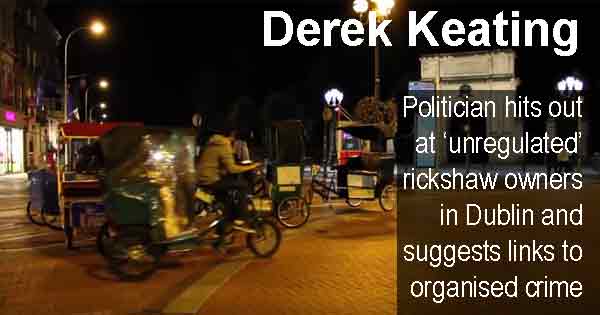An Irish politician has claimed that rickshaw owners in Dublin may be linked to organised crime and must be stopped before it is too late.
Rickshaws are cycles with a carriage attached to the back. They are popular with tourists in Dublin and many cities across the world.
The extraordinary claim came from Fine Gael politician Derek Keating. Writing for thejournal.ie he said that rickshaw owners can take up to €15,000 per week in untaxed income.

He said that the rickshaw owners do not need a licence either for themselves or their vehicle. They are not accountable if there is an accident and there are no regulations on what they are allowed to charge for a journey – meaning that tourists can be charged up to €15-€20 for journeys of as little as 500 metres.
He said: “These vehicles have neither registration, insurance nor public service vehicle identification and are operated for reward by unqualified persons.
“These vehicles, which have been the subject of media comment for their involvement in street incidents causing injury, are being driven often overloaded, with no regard for road traffic legislation, and operate in pedestrian-only areas and footpaths, with disregard for other road users and pedestrians.
“The daily so called ‘chariot races’ that happen late at night down Grafton Street are a great danger to pedestrian traffic on the street.”
Mr Keating said that the huge sums of money that can be earned by rickshaw owners is starting to attract organised crime gangs.
He said: “Criminal gangs and South American drug dealers and home-grown criminals are encroaching on the trade because of its lucrative cash take. Personally, I’m of the view that this is all untaxed income.”
He called on Dublin City Council act as rickshaws are not currently defined in any law. There is no legislation to regulate things such as the number of passengers allowed in a carriage or how much the owners are entitled to charge for certain journeys.
There is also no requirement to have the passengers or third parties insured in the event of accident or injury.
Mr Keating said said: “It is high time that proper protection and regulation is put in place to ensure that the public are properly protected in all aspects of rickshaw use, including when accidents happen.”